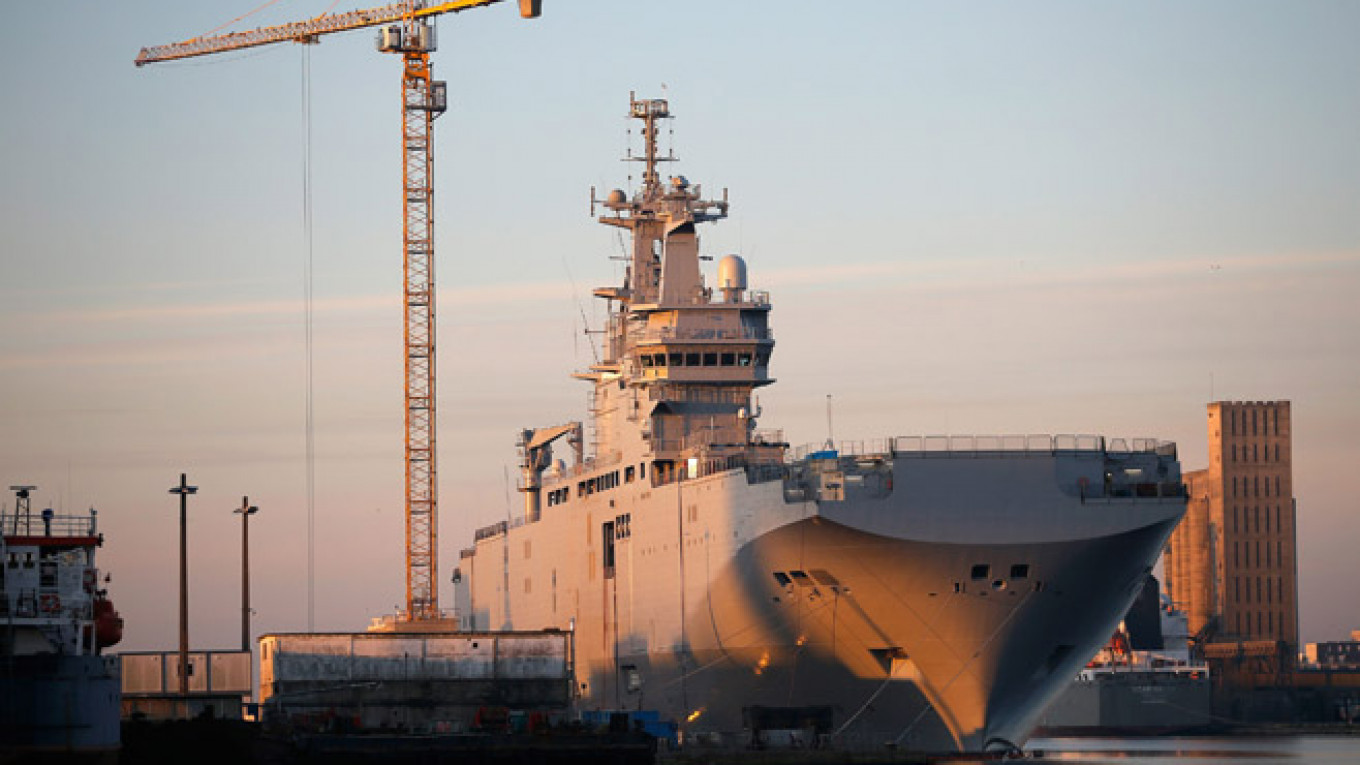The recent sinking of the Mistral deal, in which France was to have supplied Russia with high-tech assault craft for 1.2 billion euros ($1.66 billion), was heralded as a political victory for the West. But despite the political setback, it may not be a military defeat. Russia may be able to procure a replacement from a more friendly nation — perhaps even turning to staunch U.S. ally South Korea.
Russia originally placed the order with the French shipbuilding firm DCNS in 2011. The contract called for an initial delivery of two ships with modifications to accommodate Russian weapons systems and to enable the vessel to withstand extreme cold. Construction proceeded on schedule and the first ship, the Vladivostok, was slated for delivery to Russia in October 2014. However, the West scuttled the deal over its dissatisfaction with Russia's policy toward Ukraine.
Although France long resisted pressure from fellow EU member countries, NATO and the U.S. to cancel delivery, on the eve of the recent NATO summit French President Francois Hollande stated that the necessary condition for the transfer of the ships — namely, an effective cease-fire in eastern Ukraine — did not exist.
Accepting for now the argument that the Russian navy does, in fact, need this class of amphibious assault ship, the question arises as to where it can obtain them.
The Mistral, after all, is a highly advanced design, intended for long-term deployment in distant waters and capable of functioning both as an assault craft and as a command ship.
This cutting-edge warship is highly automated, and represents the world's first major combat vessels equipped with electric generating plants and azimuth thrusters. The ship's inner well deck can hold four LCM landing craft, two U.S.-made LCAC hovercraft or two L-CAT high-speed catamarans.
Obviously, both the Soviet and Russian shipbuilding industries lack the experience necessary to build ships of that technological complexity. The amphibious assault ships built by the Soviet navy and inherited by the Russian navy are conceptually and technologically very different. And given the fact that Russia has not even undertaken the research and design of such ships in its modern history, it would take several years at best before construction could even begin on one.
In fact, the construction process itself could take even longer because all of the country's shipbuilding facilities are currently busy carrying out existing orders for modernizing the military by 2020 — not to mention demands of the commercial shipbuilding program as well.
Worse, the current sanctions on dual-use technologies means that Russia would have little chance of procuring the advanced equipment found on the Mistral ships in order to build similar vessels domestically.
The only remaining option is to cooperate with one of the parties that participated in the original tender along with the French. For obvious reasons, Russia cannot currently conclude contracts with the Dutch company Damen Schelde Naval Shipbuilding or Navantia of Spain, but it might consider approaching Daewoo Shipbuilding & Marine Engineering, or DSME, of South Korea that offered its Dokdo ship through the Russian Svezda company for the tender.
The Dodko, equipped with an inner well deck holding two LCAC hovercraft and an underdeck hanger holding up to 10 UH-60 Black Hawk helicopters, could be an acceptable replacement for the Mistral. What's more, in contrast to analogous ships from other countries, the South Korean vessel is designed not for cruising distant seas, but for operations closer to home. In other words, its intended purpose is more in line with the needs of the Russian fleet.
Of course, like most other South Korean military hardware, the Dodko includes a significant quantity of U.S.-made equipment, whose export would likely fall under ITAR (International Traffic in Arms Regulations) and therefore be reviewed and blocked by the U.S.
However, that creates an opportunity for DSME to cooperate with Moscow, with Russia delivering or developing systems comparable to those now built in the U.S.
It is also worth noting that Russia has more extensive experience working with the South Koreans in developing high-tech military equipment than it has with the French. For example, Russia supplied the RD-191 engine for the South Korean KSLV-1 rockets, designed the multifunctional radar for the KM-SAM medium-range air defense system and also took an active part in developing the South Korean Chiron-1 MANPADS.
What's more, this collaboration has proven mutually advantageous: equipment that Russia developed for South Korea has often found applications at home. For example, the success of the KSLV-1 led to Russia developing the first stage of the Angara universal rocket module and the radar used in the KM-SAM will be part of Russia's new Vityaz missile system.
We can therefore conclude that joint Russian-South Korean production of an amphibious assault ship represents a viable alternative to the French Mistral project.What's more, with Russian hardware on board and Moscow's participation, the South Korean Dodko warship might prove an even more formidable player in the global arms market.
Andrei Frolov is editor-in-chief of Export Vooruzheny magazine.
A Message from The Moscow Times:
Dear readers,
We are facing unprecedented challenges. Russia's Prosecutor General's Office has designated The Moscow Times as an "undesirable" organization, criminalizing our work and putting our staff at risk of prosecution. This follows our earlier unjust labeling as a "foreign agent."
These actions are direct attempts to silence independent journalism in Russia. The authorities claim our work "discredits the decisions of the Russian leadership." We see things differently: we strive to provide accurate, unbiased reporting on Russia.
We, the journalists of The Moscow Times, refuse to be silenced. But to continue our work, we need your help.
Your support, no matter how small, makes a world of difference. If you can, please support us monthly starting from just $2. It's quick to set up, and every contribution makes a significant impact.
By supporting The Moscow Times, you're defending open, independent journalism in the face of repression. Thank you for standing with us.
Remind me later.






